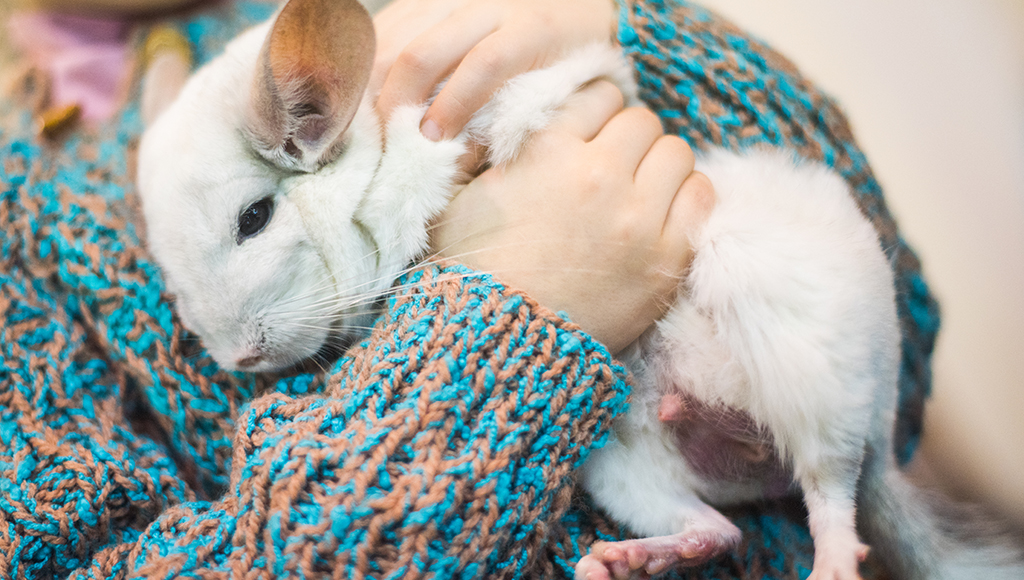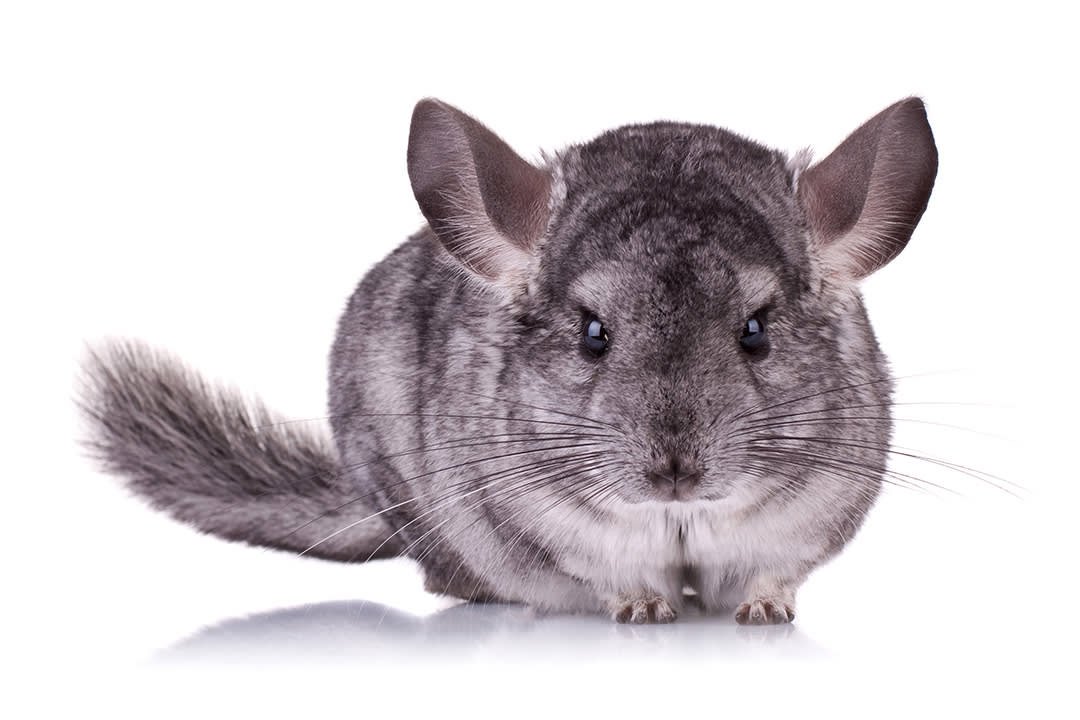To care for a pet chinchilla, provide a spacious cage with opportunities for jumping and climbing, a proper diet of hay, pellets, and fresh water, and regular dust baths for grooming.
:strip_icc()/chinchillas-1236769-hero-9109e8f688974fbb852f67da07d76000.jpg)
Credit: www.thesprucepets.com
Basic Care
Caring for a pet chinchilla requires a spacious cage, a balanced diet of hay and pellets, fresh water, and regular dust baths. Although it takes effort, the reward of having these curious and low-maintenance creatures as pets is worth it.
Cage Setup
When it comes to setting up a cage for your pet chinchilla, there are a few important factors to consider. The first is size – chinchillas need plenty of space to move around and exercise. Aim for a cage that is at least 3 feet by 2 feet in size. Additionally, choose a cage with vertical space, as chinchillas are excellent jumpers. In terms of flooring, avoid wire-bottomed cages, as they can harm your chinchilla’s delicate feet. Instead, opt for solid flooring or use a solid plastic mat to cover wire-bottomed cages. Provide a variety of ledges and platforms within the cage for your chinchilla to climb and rest on.Cleaning
Cleaning your chinchilla’s cage is crucial for maintaining their health and wellbeing. Start by spot cleaning the cage daily, removing any droppings, uneaten food, or soiled bedding. Once a week, perform a more thorough cleaning. Remove your chinchilla from the cage and transfer them to a secure temporary enclosure. Empty out all bedding and scrub the cage with a pet-safe cleaning solution. Rinse thoroughly and allow the cage to dry completely before adding fresh bedding. Regularly wash and disinfect food and water dishes as well.Diet
Proper nutrition is essential for keeping your chinchilla healthy. The majority of their diet should consist of high-quality hay, which provides necessary fiber and promotes dental health. Timothy hay is a popular choice for chinchillas. Additionally, provide a small amount of commercially-made chinchilla pellets each day to ensure they receive essential vitamins and minerals. Fresh water should always be available, preferably provided in a water bottle with a sipper tube to prevent contamination. Avoid feeding your chinchilla sugary or fatty treats, as these can lead to digestive issues and obesity.Hygiene
Hygiene plays a significant role in your chinchilla’s well-being. Chinchillas have dense fur that can become matted or dirty if not properly cared for. To help them maintain a healthy coat, provide a dust bath at least twice a week. Fill a shallow container with chinchilla-specific dust and allow your pet to roll and frolic in it for about 10-15 minutes. Regularly check your chinchilla’s fur for any signs of matting or illness. Inspect their teeth, eyes, and ears for any abnormalities. If you notice anything out of the ordinary, consult a veterinarian for further guidance. By following these basic care guidelines for your pet chinchilla, you’ll ensure they lead a happy and healthy life. Remember to provide them with a spacious and stimulating cage, maintain cleanliness, offer a proper diet, and prioritize their hygiene needs. Taking the time to care for your chinchilla properly will result in a rewarding and joyful pet ownership experience.:strip_icc()/chinchillas-t2-1236769_FINAL-5bdb725ec9e77c0026d4f1c2.png)
Credit: www.thesprucepets.com
Special Considerations
When it comes to caring for a pet chinchilla, there are some special considerations that you need to keep in mind. Chinchillas have unique needs and require specific care to ensure their health and well-being. In this section, we will cover three important aspects of chinchilla care: handling, socialization, and maintenance level.
Handling
Chinchillas can be sensitive to touch, so it’s important to handle them gently and with care. When picking up your chinchilla, make sure to support their body and avoid squeezing or applying too much pressure. It’s best to scoop them up from underneath and let them rest on your hands.
Remember, chinchillas are prey animals, so they may feel vulnerable when handled. It’s important to build trust with your chinchilla by starting with short handling sessions and gradually increasing the duration as they become more comfortable. Always supervise children when handling chinchillas to ensure their safety and well-being.
Socialization
Chinchillas are social animals and thrive when they have opportunities for social interaction. While they may not enjoy being handled for long periods, they still appreciate regular socialization with their owners. Spend time with your chinchilla daily, talking to them, offering treats, and providing enrichment activities.
Chinchillas can also benefit from having a same-sex companion to keep them company. However, ensure that any introductions are done slowly and under supervision to prevent any aggression or stress. Remember to provide separate cages if you decide to house multiple chinchillas to avoid any territorial issues.
Maintenance Level
Chinchillas require regular maintenance to keep them healthy and happy. Here are some key aspects of their maintenance:
- Diet: Chinchillas need a diet that primarily consists of high-quality hay and specially formulated pellets. Offer fresh water daily and limit treats to prevent digestive issues.
- Exercise: Chinchillas are active animals and need plenty of exercise. Provide them with a spacious cage that allows for jumping and climbing. You can also let them out in a secure, supervised area for additional exercise.
- Cage Cleaning: Clean the chinchilla’s cage regularly to remove waste and prevent odor. Use chinchilla-safe bedding and replace it as needed.
- Grooming: Chinchillas have unique grooming needs. They need access to a dust bath a few times a week to keep their fur clean and healthy. Additionally, check their teeth regularly and provide chew toys to help keep them worn down.
By following these special considerations for handling, socialization, and maintenance level, you can ensure that your pet chinchilla lives a happy and healthy life.
Health And Wellness
Caring for a pet chinchilla requires providing a spacious cage, a proper diet of hay and pellets, fresh water, and regular dust baths for their fur. Although it takes some effort, the rewarding experience is worth it.
Lifespan
A chinchilla’s lifespan can range from 10 to 20 years, making them long-term companions. To ensure your pet lives a healthy and fulfilling life, it’s essential to prioritize their overall wellbeing.Grooming
Grooming plays a crucial role in maintaining a chinchilla’s health. These fluffy creatures have dense fur that needs regular attention to prevent matting and skin issues. Here are some grooming tips to keep your chinchilla looking and feeling their best:- Brush their fur gently using a soft-bristle brush or a specifically designed chinchilla comb. This helps remove loose hairs and prevent matting.
- Provide regular dust baths using chinchilla-specific dust. Dust baths help remove excess oil from their fur, keeping it clean and healthy. Set up a shallow container with dust and let your chinchilla roll around in it for 10-15 minutes.
- Trim their nails regularly to prevent overgrowth. Use a small animal nail trimmer and be cautious not to cut too close to the quick, which could cause bleeding.
- Check their teeth regularly for any signs of overgrowth or dental issues. Chinchilla teeth continue to grow throughout their lives, so providing safe chew toys and a proper diet is essential.
Common Health Issues
While chinchillas are generally healthy pets, there are a few common health issues to be aware of. Regular vet check-ups and a keen eye for any changes in behavior or physical appearance can help catch these issues early. Here are a few common health concerns:| Health Issue | Symptoms | Treatment |
|---|---|---|
| Hairballs | Lack of appetite, decreased stool production, lethargy | Increasing dietary fiber and ensuring proper hydration |
| Dental problems | Excessive drooling, difficulty eating, weight loss | Veterinary examination, possible tooth filing or extraction |
| Gastrointestinal stasis | Loss of appetite, bloating, reduced stool production | Veterinary examination, medication, and dietary adjustments |
| Fur ring | Buildup of fur around genitals, difficulty urinating or defecating | Gentle removal of fur ring or vet assistance if required |

Credit: www.petassure.com
Frequently Asked Questions Of How To Care For A Pet Chinchilla
Are Chinchillas Hard To Care For?
Caring for chinchillas requires effort, but it can be rewarding. They need a spacious cage, a proper diet of hay and pellets, regular dust baths, and fresh water. Chinchillas don’t enjoy being handled too much but can learn to enjoy being petted.
They are relatively low-maintenance pets and are generally clean and quiet. It’s best not to leave them alone for extended periods of time.
Do Chinchillas Like To Be Handled?
Chinchillas can learn to enjoy being with familiar people and being petted, but they do not typically enjoy being handled and may struggle when picked up. They are curious creatures that use their mouths to explore and chew items around them.
Are Chinchillas High Maintenance?
Chinchillas are not high maintenance. They require a spacious cage, a proper diet, and regular dust baths for their fur. They are relatively low-maintenance pets, suitable for apartment living. They should not be left alone for extended periods of time.
Can You Leave A Chinchilla Alone For A Week?
No, chinchillas are social animals and should not be left alone for a week.
Conclusion
Caring for a pet chinchilla may require some effort, but it is undoubtedly a rewarding experience. To ensure their well-being, provide them with a spacious cage, a balanced diet of hay and pellets, and regular dust baths. Chinchillas are not high-maintenance pets and are generally quiet and clean.
However, it is important to remember that they are social animals and thrive on interaction. Avoid leaving them alone for extended periods, ensuring they have enough food, water, and a clean environment when you are away. Overall, with the right care and attention, owning a chinchilla can be a delightful journey.


